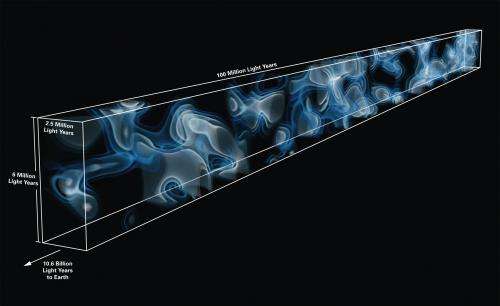October 20, 2014 report
Best of Last Week – First map of hidden universe, pursuit of compact fusion and new clues about the causes of depression

(Phys.org) —It was an interesting week for physics as scientists built the first map of the hidden universe—astronomers led by a team with the Max Planck Institute in Germany created the first 3D map of the universe depicting things just three billion years after the Big Bang. Also, Lockheed Martin revealed new details about its pursuit of a compact fusion reactor concept, announcing they are on the fast track to developing what they describe as the ultimate power source and predicting they'll have a prototype in just five years. And a team of physicists from China and Singapore conducted quantum tests that strengthen support for EPR steering—it concerns particularly strong types of entanglement in which the two systems are not just correlated, but are correlated in a specific direction.
It was a pretty big week for earth and space scientists, too, as an international team of researchers announced that they'd found evidence that Earth's magnetic field could flip within a human lifetime—or put another way, as quickly as within a hundred years. Also another team of researchers in the U.S. took another look and found that the increase of CO2 in the atmosphere is lower than predicted because of plants. And that top secret shuttle-looking plane the U.S. Air Force has been testing landed at an Air Force base in southern California after flying for nearly two years, inviting widespread speculation as to its purpose.
In more practical news, scientists in Singapore have come up with a new type of battery that can be recharged up to 70 percent in just two minutes—and will last up to 20 years. And a team at Siemens announced that they'd developed a drive system that saves space and weight in electric cars—allowing the cars to go farther on a charge. Unrelated but still remarkable, a team of researchers in the U.K. announced that they had found what they believe to be the underlying cause of 40 per cent of pre-term births—if they can find a cure, it might mean drastically reducing the number of deaths of babies due to premature birth.
And finally, it turns out that depression in some people may be related to the way gut bacteria helps keep the brain healthy–and how it could play a role in the treatment of depression. Have we been causing our own depression by killing off our gut biome with antibiotics? New research suggests that's entirely possible.
© 2014 Phys.org





















